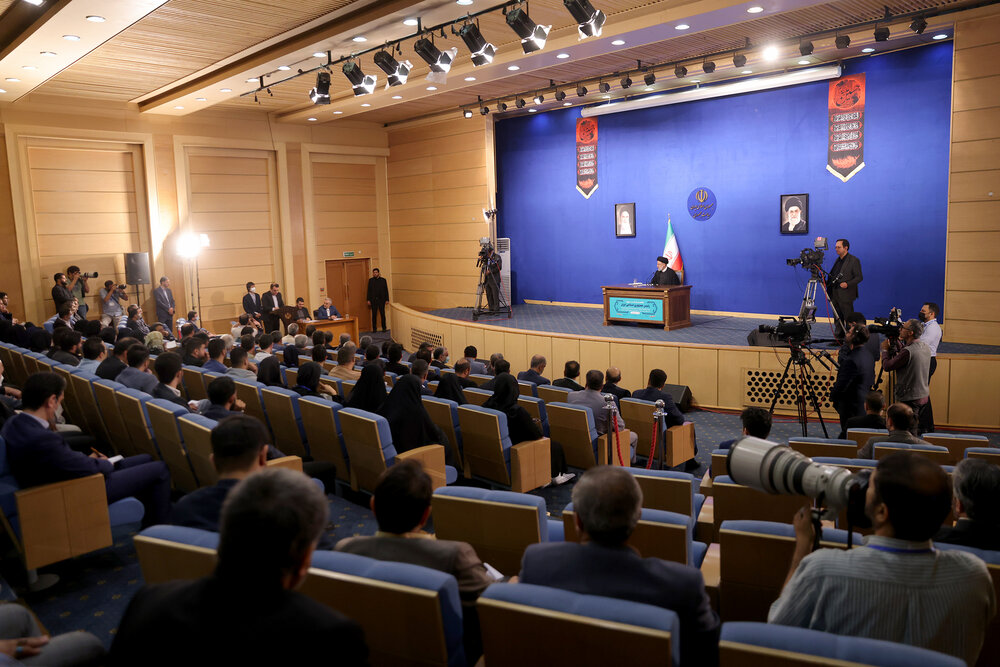No deal without safeguards

TEHRAN – Iranian President Ayatollah Seyed Ebrahim Raisi has addressed the situation around talks in Vienna over reviving the 2015 Iran nuclear deal, outlining the Iranian parameters for a deal with the West.
President Raisi rarely speaks about the Vienna talks, but when he does so, he speaks to the point. On Monday, he touched on the Vienna talks at a comprehensive press conference attended by Iranian and foreign reporters. Ayatollah Raisi took many questions on a range of internal and external issues.
As regards the nuclear talks, Ayatollah Raisi said Iran has been committed to negotiations while also working to neutralize U.S. sanctions.
“We did not leave the negotiating table to remove the sanctions, the negotiation is for lifting the sanctions and those who abandoned their commitment should return and fulfill their commitments. Our emphasis in these negotiations is the lifting of sanctions,” President Raisi said.
He outlined the parameters for reaching a deal, saying that such a deal would require four conditions: credible guarantees, practical verification of sanctions removal, lasting and meaningful sanctions relief, and the closure of political allegations made by the International Atomic Energy Agency.
Ayatollah Raisi said the talks are proceeding within the framework of removing U.S. sanctions on Iran. In this regard, he put emphasis on the need to put an end to the IAEA probe into Iran’s past nuclear activity, which has been triggered by allegations submitted by Israel.
Relying on Israel-supplied documents, the IAEA has requested answers from Iran about nuclear particles found at a number of Iranian sites. Iran gave its answers but the IAEA insists on greater cooperation, a move that has been seen by Iran as politically motivated and incompatible with the technical nature of IAEA work.
President Raisi said reaching a deal is now dependent on the IAEA closing its probe. “We emphasized verification and confidence-building assurances in the negotiations. We also emphasize that safeguards issues must be resolved and this is a pillar in the negotiations and without it, the talk of an agreement has no meaning,” he said.
Raisi added, “The agreement should be accompanied by the resolution of safeguards issues and points that Iran follows as a strategy. We have not and will not fail to realize the interests of the Iranian nation.”
Raisi’s emphasis on the resolution of safeguards issues comes against a backdrop of Iranian consultations over how to respond to a U.S. response to an earlier Iranian response, which had been relayed to Washington by the European Union’s foreign policy chief, Josep Borrell, who acts as the coordinator for the Vienna talks.
In an interview with the Austrian Kronen Zeitung newspaper, Josep Borrell said he received the U.S. response to an Iranian response and is optimistic about the state of the talks.
“I got the response from the U.S. It is now up to Iran to respond to them,” he said, thanking Austria for its role in the talks.
“We have arrived at the crucial moment. I'm optimistic, it's the last millimeters,” Borrell said.
Iran is still reviewing the U.S. response, with reports saying that the review will come to an end by Friday. At least until the end of Friday, Iran will conclude a review of the United States’ response to the European Union’s draft text intended to revive the 2015 nuclear deal, a news website close to Iran’s Supreme National Security Council said in a tweet on Sunday.
Nour News said the detailed examination of the U.S. response is going on at expert levels.
Leave a Comment